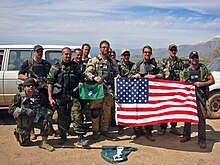|
Islamic Emirate of Kurdistan
The Islamic Emirate of Kurdistan (Kurdish: میرنشینی ئیسلامیی کوردستان), was an unrecognized Kurdish Islamic state located in the Halabja Governorate. It had been outside the control of the Iraqi government since 1991, and was a self-governing entity within the Kurdistan Region in 1994, and officially declared independence in 2001. It ceased to exist after Operation Viking Hammer. HistoryBackgroundThe 1991 Iraqi uprisings included the Kurdistan Democratic Party (KDP), Patriotic Union of Kurdistan (PUK), and the Kurdistan Islamic Movement (IMK), which rebelled against the Iraqi government and established the Kurdistan Region. The IMK continued to have a significant presence in the Kurdistan Region. Later, the Iraqi Kurdish Civil War erupted between the KDP and PUK. As part of the agreements, control of the Kurdistan Region was divided into three sections. The KDP was given Duhok Governorate and Erbil Governorate, the PUK was given Sulaymaniyah Governorate, and the IMK was given Halabja Governorate. The emirate was a part of the Kurdistan Region, although not under the jurisdiction of the Kurdistan Regional Government. When the IMK was incorporated into the KRG, some left the IMK and formed their own groups, which continued to operate in the emirate.[1][2] Among the groups were Islah led by Mullah Krekar, the Kurdistan Justice Group led by Ali Bapir, and Jund al-Islam (a merger of the Tawhid Islamic Front, the Islamic Resistance Movement, and the Second Soran Unit) led by Abu Abdullah al-Shafi'i.[3] Mullah Krekar was the military commander of the IMK from 1991 until he left to form Islah in 2001.[4] In 2001, Mullah Krekar seized control of the emirate and declared independence, and stated his intentions of expanding the Islamic emirate to include all of Greater Kurdistan. Mullah Krekar presented the Islamic emirate as an independent Kurdish state and claimed that it would not expand past Kurdistan.[5][6][7] In the Islamic emirate, Islah and Jund al-Islam merged to form Ansar al-Islam, which acted as the military of the Islamic emirate.[3] Mullah Krekar, leader of Ansar al-Islam, was the Emir of the Emirate, while Abu Abdullah al-Shafi'i was his deputy. With the area under a de facto embargo from all sides, Sunni Kurdish jihadists from neighbouring Iran gave vital cross-border support to the Emirate, setting up networks that illegally smuggled to the area.[8][9][10][11][12] Life under the Islamic EmirateLike Mullah Krekar, many Ansar al-Islam fighters and leaders also held nationalist views and treated the new emirate as a victory of the Kurdish independence movement. They were also traditionalists who promoted the Kurdish culture socially. Despite many nationalist policies, elements of nationalism which contradicted Islam were abandoned.[13][6][7] It was also reported that Ansar al-Islam enforced strict Sharia law, committed atrocities against the Yarsani minority, and destroyed Sufi shrines and khanqahs.[14][15][16] The Islamic Emirate of Kurdistan had diplomatic relations with the Islamic Emirate of Afghanistan under Mullah Omar, and would send Kurds to Afghanistan to receive training from the Taliban or Al-Qaeda.[17] They also sent delegations to Osama bin Laden in Afghanistan.[18] The IRGC were accused of being reckless about what was happening at their borders.[10] Collapse After launching the invasion of Iraq, the government of Bülent Ecevit denied the United States permission to enter Iraq from Turkish territory. The United States launched Operation Viking Hammer in 2003. After the loss of the Emirate, many Ansar fighters gathered at the Iran–Iraq border, where they were smuggled into Iran by Sunni Iranian Kurdish sympathisers across the border.[19] After the collapse of the emirate, Abu Abdullah al-Shafi'i took leadership of Ansar al-Islam, which relocated to the Hamrin Mountains and fought against the US-led coalition forces in the Iraqi insurgency, while Mullah Krekar left for Norway. Mullah Krekar founded and led Rawti Shax until his arrest in 2015.[20][21] Ali Bapir later reconciled with the Kurdistan Regional Government.[22][23] In late 2016, around the 15th anniversary of the emirate, Mullah Krekar said that "I hope we separate from Iraq as soon as possible. I would support it wholeheartedly. We were annexed to the Iraqi state under force in 1921, a state that is a failed state in every sense. The first time Iraq purchased aircraft, they bombed the Kingdom of Kurdistan and Sulaymaniyah. If a tiny part of Kurdistan is separated from Iraq and declares independence, I will endorse it fully. When Mauritania declared independence, they didn't even have a building to wave their flag upon, but still they declared independence." He also claimed that he no longer held resentment towards Kurdish government officials. Hoshyar Zebari confirmed that the Kurdish government made peace with Krekar.[24] See also
References
|
||||||||||||||||||||||||||||||||||||||||

